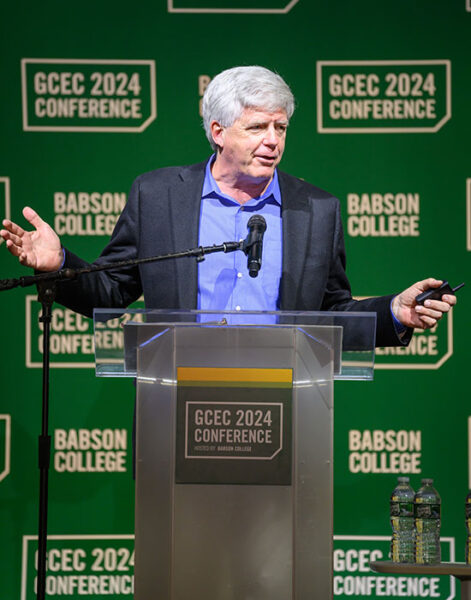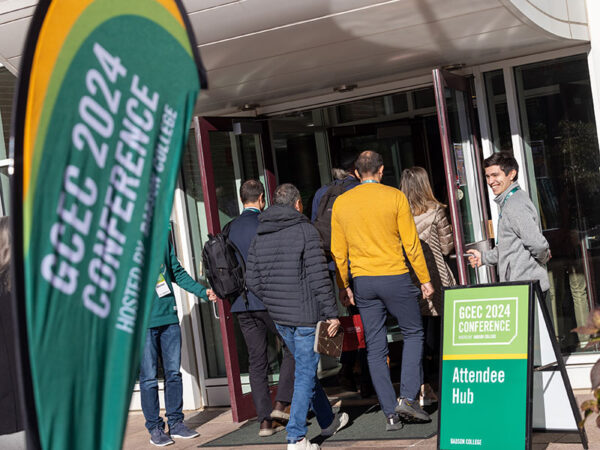The GCEC Conference Brings Entrepreneurship Educators to Babson
Babson President Stephen Spinelli Jr. MBA’92, PhD admitted to feeling just a little nervous as he stood in front of a full house at the Len Green Recreation and Athletics Complex.
The audience was filled with more than 700 entrepreneurship educators from around the country and 20 countries across the globe. This was a well-accomplished group. “I’m almost overwhelmed by the quality and the quantity of the talent in this room,” Spinelli said. “I’m more nervous talking to this group than maybe any group that I’m going to talk to this year.”
The occasion was the 28th annual conference of the Global Consortium of Entrepreneurship Centers (GCEC), an academic organization for university-based entrepreneurship programs. The GCEC conference—hosted by the Arthur M. Blank School for Entrepreneurial Leadership—returned to Babson last week for the first time since 2002, and the campus filled with attendees networking, visiting vendors, and hustling off to sessions.
READ MORE: This is the first article in a two-part series examining the lessons and learnings of the GCEC conference. Next is a look at featured speaker Heidi Neck, Babson’s Jeffry A. Timmons Professor of Entrepreneurial Studies, who spoke of entrepreneurship’s role in students’ lives.
Spinelli was the featured speaker at the conference’s opening session. Before him stood a crowd of like-minded people, educators from colleges that, like Babson, had helped to build entrepreneurship into a core academic discipline. “You are my people,” he told the largest crowd ever attending a GCEC conference. “The 700 people here today are a reflection of the burgeoning, scaling impact we’re having around the world.”
What follows is a look at just a few of the dozens of GCEC sessions, which covered a host of rich topics, from artificial intelligence and innovation, to sustainability and diversity, to funding and growth.
A Snapshot of the Sessions
Professors from top entrepreneurship programs spoke at the three-day GCEC conference, and Babson was well represented.
Forming Partnerships: In a session entitled Cultivating Values-Based Relationships that Matter Most, the College’s Cheryl Kiser looked at how entrepreneurship centers and institutes can identify partnerships and funding sources. “How do you get that durable support over the long haul?” said Kiser, the founding executive director of the Institute for Social Innovation. “It starts with a conversation.”

In those conversations with potential partners, Kiser looks to see if their core values align. That alignment is essential to building a long-term connection. “We look at what our mission and values are. We look at what their mission and values are,” she said. “We look at our stakeholders, we look at theirs, and we find where we can create solutions together.”
Opportunities from Space: In a session entitled Scaling Opportunities with NASA’s Technology Resources for Entrepreneurs, Babson’s Caroline Daniels and NASA’s Jeanne King took attendees on a long trip, from outer space to Earth. They discussed how technology developed by NASA can be used for terrestrial purposes, including by entrepreneurs seeking opportunities and entrepreneurship educators working with students.
“A lot is available for licensing and learning opportunities,” said King, an innovative partnership specialist and technology partner at NASA. “We seek to get that out of the lab and into the hands of entrepreneurs and companies.”
A slew of industries—fashion, health care, agriculture, financial technology—have utilized NASA technology. Baby formula, ski goggles, and invisible braces are all examples of products incorporating its intellectual property. “It’s mind boggling in terms of all the capabilities that are available,” said Daniels, a professor of practice in entrepreneurship. “I can’t think of an industry that wouldn’t benefit from some of this research.”
AI in Business: A featured speaker, Tom Davenport considered the state of AI. While some organizations have taken an “all in” approach to the technology, many have simply tinkered with it, pursuing smaller steps. “It’s mostly a lot of experimentation,” said Davenport, the President’s Distinguished Professor of Information Technology.
Many machine learning models that are developed aren’t even implemented. “It takes a lot of time and effort to fully implement these models,” said Davenport, who also serves as faculty director of Babson’s C. Dean Metropoulos Institute for Technology and Entrepreneurship. “You have to train people, you have to change your business process, you have to integrate it with your existing systems, so you just don’t see it that often.”
Discussing entrepreneurs specifically, Davenport said one looming challenge they face is the data that powers AI. “The big challenge is getting some data that’s really different from what everybody else has as a startup,” he said. “It’s hard to get a source of proprietary data.”
More on AI
Many speakers from outside Babson spoke at GCEC as well, and as they offered insights on important matters in entrepreneurship education, AI remained a frequent topic.
Students and AI: Calling AI a “game changer,” MIT’s Paul Cheek discussed using generative AI with students in a session entitled Revolutionizing Entrepreneurship Education: Embracing AI and GenAI with MIT Orbit.

The executive director of the Martin Trust Center for MIT Entrepreneurship, Cheek outlined a custom-built generative AI program that supports students through a 24-step entrepreneurial framework. Developed at MIT and known as Orbit, that methodology guides users from identifying their target market to scaling their businesses.
As AI reshapes the entrepreneurial landscape, Cheek believes educators must adapt. “Entrepreneurship is changing rapidly,” Cheek said. “To develop the next generation of innovators, we must keep pace with the technology shaping their future.”
Interdisciplinary Connections: One session concentrated on AI’s effect on a single city: Baltimore. That panel session—Generative AI and Its Impact on Business and Education: Catalyzing Baltimore’s Innovation Ecosystem—was moderated by Henry Mortimer, director of the University of Baltimore’s Center for Entrepreneurship and Innovation and included Paul Davidson from Johns Hopkins University. Davidson noted how AI is cutting across every aspect of entrepreneurship.
“What I found very exciting is it’s really touching every industry,” said Davidson, the associate director of the Pava Center for Entrepreneurship at Johns Hopkins University. “A lot of students are thinking, how can AI improve some of the passions or interests or business areas that they already have, and sometimes they don’t necessarily have AI skills themselves, but I’ve seen a lot of interdisciplinary connections between various students and backgrounds and schools.”
Throughout the GCEC conference, visitors to campus expressed appreciation and praise for Babson’s efforts as host. Bruce Leech, the executive director of the Coleman Entrepreneurship Center at DePaul University, knows firsthand how much work goes into hosting. Leech serves on the GCEC Board of Advisors and chairs its conference committee, and DePaul hosted the event in 2018.
“You really appreciate the work it takes to host this when you’ve done it yourself,” Leech said. “Everything Babson does is top quality. Reputationally, Babson is so strong that I know everybody was excited to have Babson host this year.”
Additional reporting conducted for this story by Eric Beato and Hillary Chabot.
Posted in Entrepreneurial Leadership





